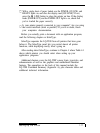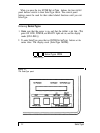
* LOAD MACRO
The *Load Macro mode lets you load one of the preset macros, or a
macro you’ve created. You can use the *Change Macro mode to create
and save your own macro.
When you turn the printer on, one of the four macros is loaded
automatically as the default macro. As described under *Change
Defaults mode, the preset default macro is macro 1.
The preset macros
While you’re learning SelecType, you may want to use the four preset
macros. These macros are set for use with general application
programs.
The facing page shows samples printed out with these four macros,
You can use the *Print Out Settings mode to see the specific settings
contained in these macros.
Macro 1--Draft printing/word processing. This macro is set for high-
speed, draft quality printing. It can be used for word processing to print
rough drafts, or for any application where you need a job printed in a
hurry See Chapter 4 for more information on word processors.
Macro 2--Letter Quality printing/word processing. This macro is set for
Letter Quality printing. It can be used for word processing to print a
final document, or for any application where you want a polished
result. Although the Roman font is installed for this macro, you can
select any of the other Letter Quality fonts with the LQ button (see
Chapters 1 and 5) or by selecting another font in the *Change Macro
mode.
Macro 3--This macro is set specifically for printing spreadsheets. If
your spreadsheet and paper is wide enough, it prints across the full
width of the carriage (14 inches). This macro also calls for condensed
printing which allows up to 233 columns across a page. See Chapter 4
for more information on spreadsheets.
Macro 4--This macro is set specifically for printing character graphics.
It takes advantage of the Epson Graphic character table to print lines,
corners, and shaded areas as shown on the following page. See
Chapters 4 and 6 for more information on graphics programs.
2-4
SelecType


















